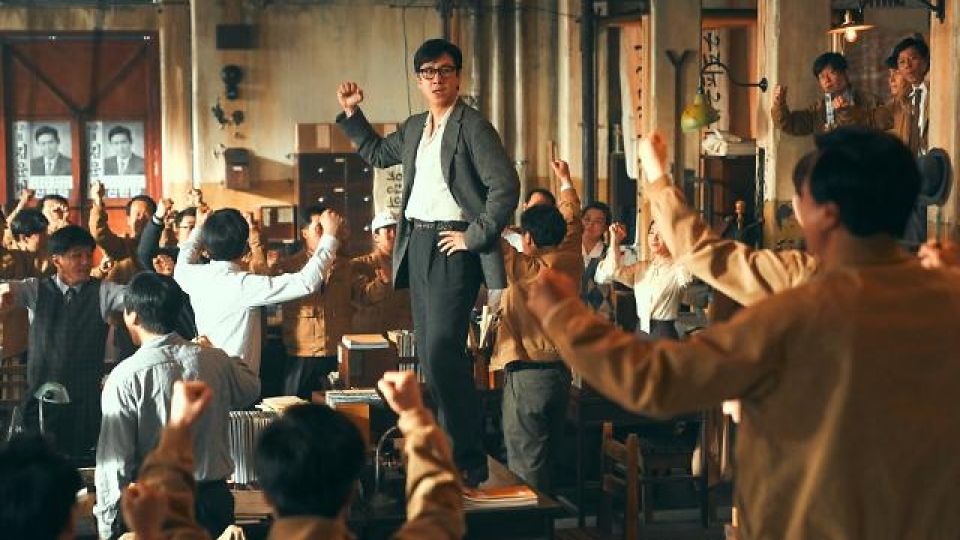June 6, 2025
SEOUL – South Korea just wrapped up a snap presidential election that saw opposition candidate Lee Jae-myung claim victory after months of political turmoil sparked by his predecessor’s botched martial law gambit.
Which makes this the perfect moment to dive into Korean cinema’s rich catalog of films about political ambition, the seductive allure of power, and the moral compromises that define public life.
From smoke-filled campaign war rooms to ancient royal courts, These three standout dramas offer engrossing takes on the nature of politics. While spanning different eras, each shares a fascination with how principles collide with reality when everything hangs in the balance.
Political strategist Seo Chang-dae meets idealistic politician Kim Woon-bum in 1961, and their partnership transforms a string of electoral defeats into a march toward power. Director Byun Sung-hyun crafts this character study around the relationship between the late Lee Sun-kyun’s Machiavellian campaign mastermind and Sol Kyung-gu’s principled presidential candidate, exploring how far good intentions can bend before they break entirely.
The film shines in its refusal to romanticize either man. Chang-dae’s dirty tricks prove devastatingly effective — vote buying, character assassination, and stoking the regional divisions that still plague Korean politics today all get deployed with ruthless efficiency. But Byun never lets us forget the human cost of these tactics, particularly as the two men’s friendship fractures over the question of means and ends. The late Lee Sun-kyun brings measured calculation to the role that portrays depths of ambition beneath the surface, while Sol delivers one of his finest performances as a politician wrestling with his own complicity.
Based loosely on the real-life relationship between future president Kim Dae-jung and his strategist Eom Chang-rok, “Kingmaker” asks whether winning at all costs in the name of democracy can ultimately betray the very ideals it claims to uphold. The answer it offers feels uncomfortably relevant to today’s politics worldwide.
Available on Google Play and Amazon Prime with English subtitles.
Days before President Park Chung-hee’s assassination in 1979, Korean CIA director Kim Gyu-pyeong finds himself caught between loyalty to an increasingly paranoid dictator and his own moral compass. The regime’s inner circle becomes a nest of competing ambitions, with Kim facing off against the president’s warmongering security chief (Lee Hee-jun) as he grapples with growing popular unrest and pressure from Washington.
Director Woo Min-ho (“Inside Men,” “Harbin”) transforms this historical thriller into a masterclass in political paranoia where every conversation carries the weight of life and death. His direction maintains a carefully calibrated pace that allows tension to build organically, which explodes in a brutal finale that strips away any romanticism about political violence. As Korean cinema’s most dependable leading man, Lee Byung-hun anchors the film with a performance of remarkable restraint and ambiguity, portraying Kim as a man whose stoic exterior barely contains his growing horror at the regime’s excesses.
“The Man Standing Next” succeeds as both compelling period drama and a timeless warning about the corrupting nature of unchecked power. Its exploration of how conflicts and pressure build up under authoritarian systems resonates far beyond the era it portrays.
Available on Disney Plus, Amazon Prime, Google Play, and Apple TV with English subtitles.
Winter of 1636 finds Korea’s Joseon dynasty trapped in a mountain fortress, besieged by Qing forces demanding submission to their new Chinese empire. Director Hwang Dong-hyuk (of “Squid Game” fame) uses this crucible of crisis to examine how high-stakes political maneuvering unfolds when a nation’s survival hangs in the balance.
The film centers on the philosophical divide between two royal advisors: Lee Byung-hun’s pragmatic minister Choi, who advocates for immediately surrender to save lives, and Kim Yun-seok’s idealistic minister Kim, who insists on fighting till the end to preserve honor. Park Hae-il’s young king becomes the fulcrum between these opposing forces, ultimately responsible for decisions that will determine not just his own fate but that of his entire kingdom.
Hwang’s direction emphasizes the physical and psychological toll of the siege alongside the intricate ideological debates unfolding within the fortress walls, with stunning cinematography that captures both the fortress’s imposing beauty and its gradual transformation into a frozen prison. The film’s deliberate pacing mirrors the dizzying complexity of the moral arguments themselves, though this methodical approach may occasionally tests the viewer’s patience.
What elevates “The Fortress” beyond spectacle is the profound sincerity with which these arguments are delivered — each side rooted in genuine devotion to the country and its people. Both ministers present their cases with riveting conviction, and the film suggests that in extreme circumstances, there may be no purely moral choices — only different forms of compromise with an unforgiving reality.
Available on Netflix with English subtitles.


